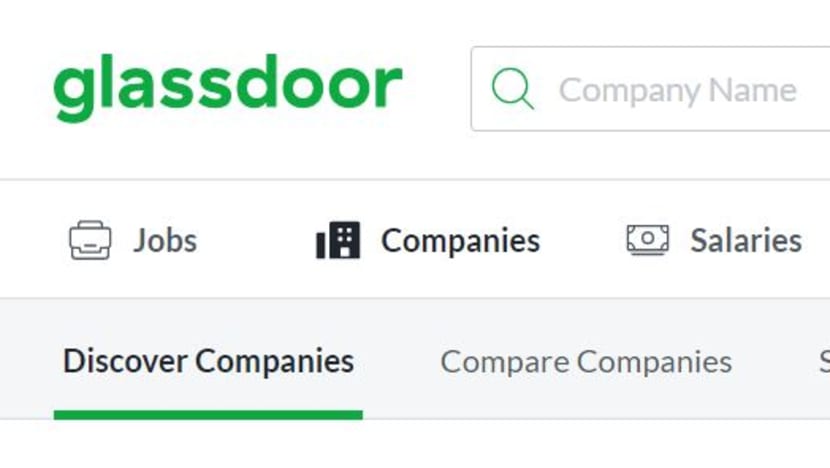Commentary: Should you apply for a job based on reviews online?
There are reviews of CEOs, line managers and companies but how do you assess if these are true? And to what extent can you base your decision on this feedback? HR expert Adrian Tan gives his view.

Apps like Glassdoor provide a platform for current or former employees to leave reviews of their companies.
SINGAPORE: My wife most recently received a job offer. Although she has been in the same industry for some time, it is not a company she is familiar with.
While she was listing down the pros and cons, I whipped out my phone and went to the Glassdoor app.
Glassdoor is an American company ratings website where current and past employees of a company can leave reviews. It is also a job search site – so people can apply for posted roles.
We looked at the company my wife was interested in. It had over 189 reviews, a 4.3 rating (the maximum is 5) and the CEO rating at 95 per cent.
My wife is currently serving her notice and will be starting with the new company in a month's time.
This entire episode made me think of just how much has changed when it comes to how we make decisions for just about anything in our lives. Scrolling to see what movie to watch? Let’s go to Rotten Tomatoes and have a look at the score.
Thinking of trying out a new restaurant? Hit up Google or reviews and look at the total score. Anything below 4 will probably not make your cut.
Related:
With time so tight and with heavy access to our devices, learning from the experiences – both the good and bad - of others seems like a reasonable way to make decisions, conserve energy, and spend time and money on other, more valuable things.
That’s all well and good for the small things in life like where to eat or what to buy. But should you make a big decision like switching jobs based purely on what the Internet spits out?
CAN YOU TRUST REVIEWS?
Companies like Glassdoor do serve a purpose. Just as a potential employer would conduct reference checks on a candidate, the converse should be done. In a hyper-competitive market for talent, both parties should be clear about what they are getting into.
But Glassdoor should not be the deciding factor in your ultimate decision.
Firstly, there is no employee verification system. Anyone can post on Glassdoor and you can do so for any company, at any point in time and with no background checks whatsoever.
Since there is no stopping people from posting reviews and posting them multiple times, you can imagine how disgruntled ex-employees can skew the ratings. Or how companies might game the system.
The human resource department of a company can easily create a Glassdoor account using different emails to post multiple positive or negative reviews. You may see a 4.9 thanks to the nifty work of the HR department.
This isn’t so far-fetched considering a 2019 Wall Street Journal investigation exposed how companies employed a range of tactics to covertly boost their Glassdoor ratings.

Even though Glassdoor states that offering incentives to employees to write good reviews violates their community guidelines, there is practically no way for them to police it. This is exactly the nature of an open platform. Just look at the type of comments that can be made on social media like Facebook.
Companies can even hire someone just to do that. For slightly more than US$100, you can get a freelancer on Fiverr to post “real employee feedback” on your Glassdoor company page.
These are extreme examples. But let’s say all of the reviews you’ve seen look legitimate and stand a low chance of being artificially boosted.
You should still take them with a fistful of salt. For example, when an ex-employee leaves on bad terms, this negative experience can be highly emotional but the facts may not be clear. Are we sure we can rely on a one-sided testimonial?
This is the same reason why you might hear more of your friends complaining about their jobs or their bosses and way fewer saying anything good, even if they've stayed at their jobs for many years. Negative events are remembered in great detail, good ones less so.
It works the same way when it comes to our experiences with food or sales. When we get angry with slow or bad service, we are quick to fire off negative feedback.
This desire to post decreases when we have a positive response – how many of us take the trouble to leave a good review when we get good service?
WORK ENVIRONMENTS ARE COMPLEX
One thing to keep in mind is that reviews are given over a period of time. A one-star five years ago may no longer reflect the company’s situation today.
And a lot of companies have offices in multiple locations or have different teams that bring with them different cultures and work environments.
Since team dynamics may differ, it is challenging to ensure company values are being practised in an ideal manner at every office. A bad review for the marketing team may not be an accurate reflection of the stellar management in the finance department.
DBS Bank has about 12,000 employees in Singapore alone and more overseas. There are only 3,800 reviews on their Glassdoor page. That's a small percentage.
If you are joining a department of 10 people, you are essentially depending on the feedback of one or two people to decide if you want to join – people you don’t know at all. That sounds pretty risky.
GOOD OLD-FASHIONED CHECKING
For many of us who had to rely on word of mouth from friends or acquaintances working in a company to find out more about the work or the culture or what the boss is like, we know a healthy dose of scepticism should accompany any reading of such reviews.
But a younger generation of fresh graduates or workers, fed on steady diet of Google and reviews of just about anything and everything, this can be challenging to navigate. A poll from insights company Feefo found that young people place more trust in verified reviews by strangers than friends or family.
My advice is for all candidates not to rule out good, old-fashioned due diligence.
If the company you are applying for has low ratings, make an effort to seek out existing employees and ask them about it. If they brush it aside, there may be some truth in it.
Triangulate the information with other professional networking sites like LinkedIn – where you can identify people who are in these networks.
Get an introduction and check in with them unofficially at an appropriate time. You can easily find LinkedIn connections working at the company you have an eye on.
Such detailed investigations may require more effort but if you are making a career move, a decision that’s arguably almost as important as choosing who to marry, then an approach of relying on reviews alone sounds too flimsy.
Adrian Tan is a Future of Work Strategist at the Institute for Human Resource Professionals.
















